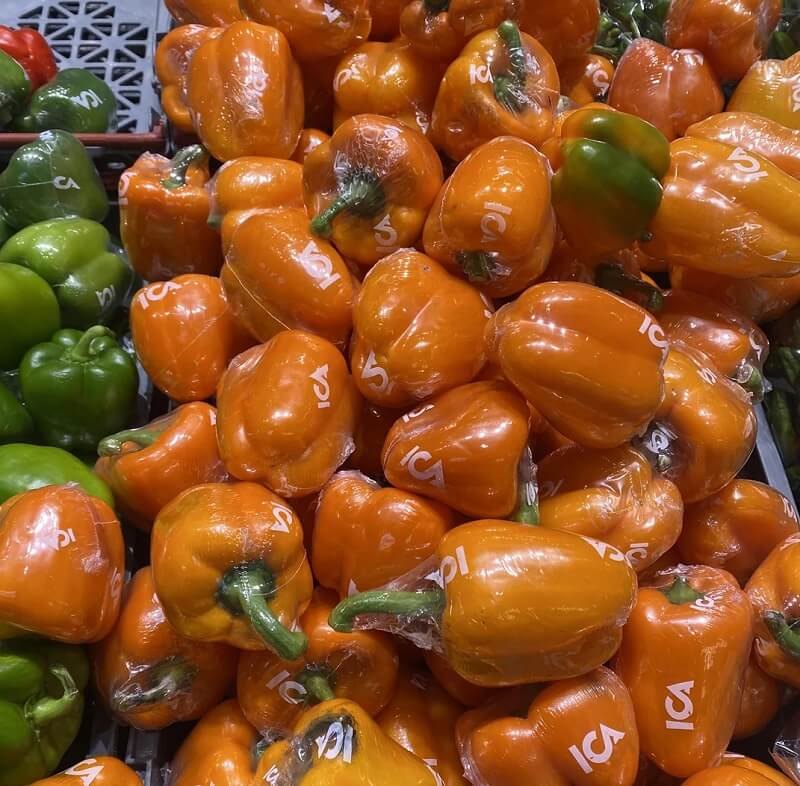The fruit and vegetable aisles at grocery stores are sparking outrage among customers, and not just because of high prices. Countless shoppers have discovered produce individually wrapped in plastic, which is pretty strange considering they already have packaging thanks to Mother Nature.
A Reddit user shared their frustrating encounter with excessively wrapped produce in r/Anticonsumption, and many commenters were equally perplexed.
What's happening?
The Redditor shared a photo of dozens of orange and green bell peppers separately wrapped in plastic (though it appears a few green bell peppers were spared).

"No words … I seriously can't understand why we'd ever need it to be individually wrapped like this! I understand that sometimes its good when like oranges are opened for disabled ppl but this doesn't really help that does it? Maybe I'm just stupid but this looked ridiculous to me," the user wrote in the post.
"That's disgusting!" one user commented.
"Lengthen the shelf life at the cost of poisoning the world with microplastics," said another.
"Because we don't have enough plastic in our brains as it is," shared another user.
Some users explained that the plastic wrap could help preserve the fruit longer or prevent mold from spreading if one bell pepper goes bad. However, if this practice is multiplied across thousands of different stores, that adds up to a lot of plastic waste.
Why does plastic waste matter?
Plastic waste can take anywhere between 20 to 500 years to break down, per the United Nations. During that time, it decomposes into smaller pieces called microplastics, which have been linked to health issues like obesity, heart problems, and reproductive disorders in humans.
🗣️ Should grocery stores donate food that's past its sell-by date?
🔘 Yes, as long as it's not bad 🤢
🔘 Yes, but only certain foods 🥫
🔘 Only if it doesn't cost the store 💸
🔘 No, it could lead to problems 👎
🗳️ Click your choice to see results and speak your mind
According to the UN Environment Programme, the world produces over 440 million tons of plastic pollution each year, and by 2050, this could reach a staggering 1,200 million tons if current production trends continue.
Just over one-third of these plastics are for single-use products like food and beverage packaging, about 85% of which ends up in landfills or as unregulated trash. When the plastic decomposes either in landfills, oceans, or elsewhere in the environment, it releases toxic chemicals that can harm plants and wildlife.
In addition, plastics are mostly made from dirty fuels like oil and gas, which create planet-warming pollution and are a major factor in the rapidly changing climate.
Are companies doing anything about this?
The commenter didn't say where they saw the plastic-wrapped bell peppers, so it's unknown what policies the company has regarding plastic waste. It's also unclear if this is a one-time occurrence at that particular store or if it's an indication of a larger trend.
However, numerous grocery chains are taking steps toward reducing plastic waste. Trader Joe's has eliminated over 12 million pounds of plastic packaging from its products, and Kroger partnered with recycling giant TerraCycle to launch a reusable packaging platform at several of its stores.
Aldi has also stopped offering plastic bags at its stores, a move which it says will eliminate 9 million pounds of plastic waste.
What's being done about plastic waste more broadly?
Aside from grocery stores saying no to plastic, there have been plenty of other exciting developments within the plastic-free movement. Apeel Sciences has developed a plant-based, edible coating for fruits and veggies that could potentially replace plastics. Starbucks is also testing compostable lids for its cold drinks in select stores in California and Minnesota.
But you don't need to be a scientist or own a corporation to make a difference. By swapping single-use plastics for reusable alternatives, such as grocery bags and water bottles, you can reduce your plastic consumption and save money. Not to mention, the planet will thank you for your act of kindness.
Join our free newsletter for good news and useful tips, and don't miss this cool list of easy ways to help yourself while helping the planet.









